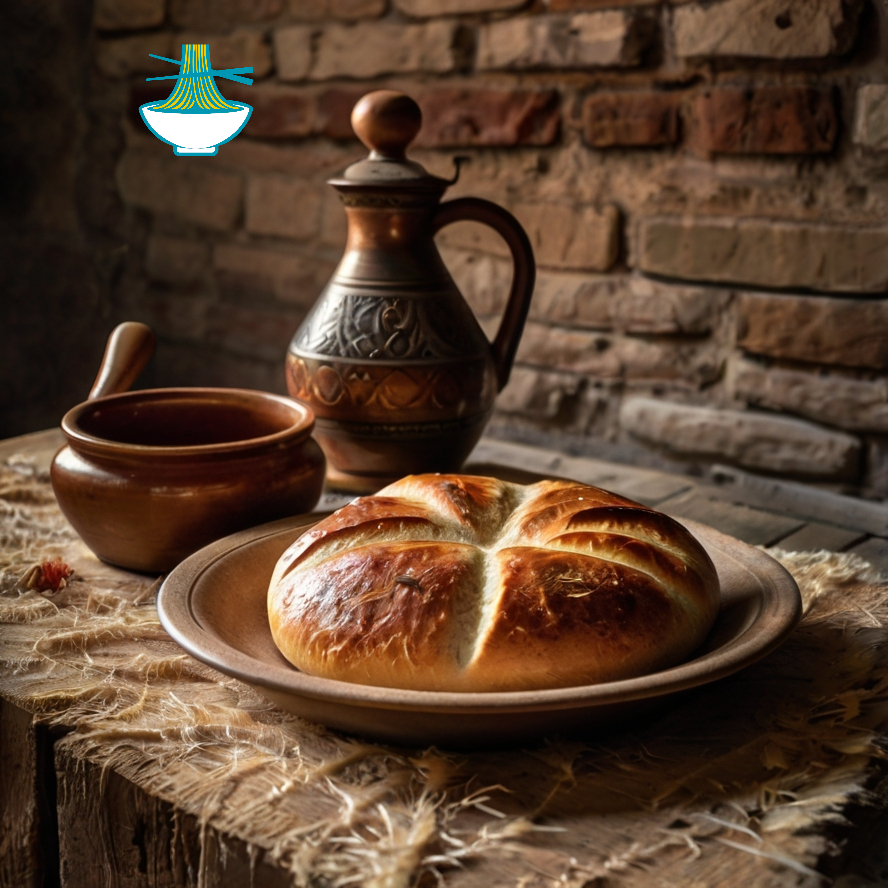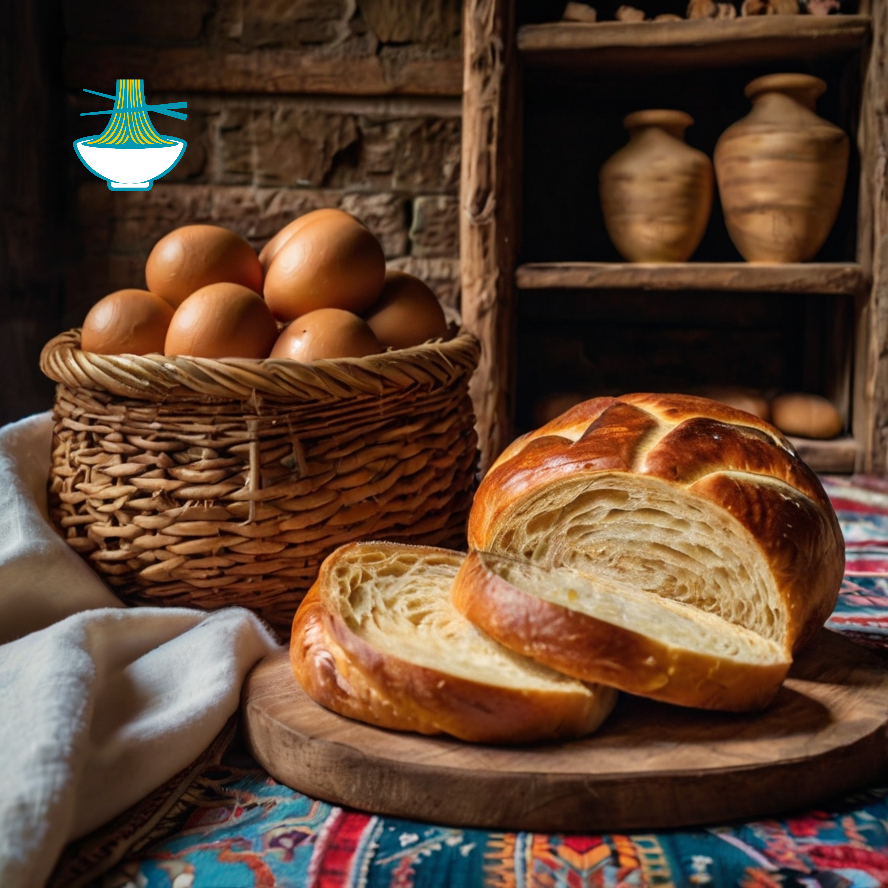Kosovo Kulaç is a cherished traditional bread hailing from Kosovo, known for its unique taste and texture that complements various dishes. This bread, often found adorning dinner tables across Kosovo, is characterized by its round, dome-like shape and soft, fluffy interior. It is typically prepared with simple ingredients like flour, yeast, salt, and sometimes yogurt or milk, which contribute to its distinct flavor profile.
The process of making Kosovo Kulaç involves careful kneading and shaping, followed by baking to achieve its golden-brown crust. The result is a delightful bread with a slightly crispy exterior and a tender, airy inside, perfect for soaking up sauces or accompanying stews and meats.
In Kosovo, Kulaç is not just bread—it's a symbol of hospitality and tradition. Families take pride in baking it for gatherings and celebrations, making it an essential part of the culinary heritage. Whether enjoyed fresh out of the oven or reheated, Kosovo Kulaç embodies the warmth and richness of Kosovo's culinary culture, making every meal a memorable experience.
Ingredients:
- 500g all-purpose flour
- 1 packet (7g) dry yeast
- 1 teaspoon sugar
- 1 teaspoon salt
- 250ml lukewarm water
- 2 tablespoons plain yogurt (optional)
- 2 tablespoons olive oil or melted butter
- Additional olive oil or butter for brushing (optional)
- Sesame seeds or nigella seeds for topping (optional)
Instructions:
1- Activate the Yeast:
2- In a small bowl, combine the dry yeast, sugar, and lukewarm water. Stir gently and let it sit for about 5-10 minutes until the mixture becomes frothy.
3- Mix the Dough:
4- In a large mixing bowl, combine the flour and salt. Make a well in the center and pour in the activated yeast mixture, yogurt (if using), and olive oil or melted butter. Mix everything together until a dough forms.
5- Knead the Dough:
6- Transfer the dough onto a lightly floured surface and knead it for about 8-10 minutes until it becomes smooth and elastic. If the dough is too sticky, add a little more flour; if it's too dry, add a bit more water.
7- First Rise:
8- Place the dough in a lightly oiled bowl, cover it with a clean kitchen towel or plastic wrap, and let it rise in a warm place for about 1-2 hours or until it doubles in size.
9- Shape the Kulaç:
10- After the dough has risen, punch it down gently to release the air. Divide the dough into smaller balls (about the size of a tennis ball). Line a baking sheet with parchment paper.
11- Second Rise:
12- Place the dough balls on the baking sheet, leaving some space between each. Cover them loosely with a kitchen towel and let them rise again for about 30-45 minutes.
13- Preheat the Oven:
14- Preheat your oven to 200°C (390°F).
15- Bake the Kulaç:
16- Optionally, brush the risen dough balls with olive oil or melted butter and sprinkle sesame seeds or nigella seeds on top. Bake in the preheated oven for 15-20 minutes or until the Kulaç turns golden brown and sounds hollow when tapped on the bottom.
17- Cool and Serve:
18- Allow the Kulaç to cool on a wire rack for a few minutes before serving. Enjoy your freshly baked Kosovo Kulaç with meals, soups, stews, or simply on its own!
This recipe yields delicious, soft bread with a lovely crust, perfect for savoring alongside various dishes as a staple of Kosovar cuisine. Adjust the toppings and seasonings according to your preference for a personalized touch!
nutritional values :
Here's the nutritional information and benefits for each ingredient in your recipe:
All-Purpose Flour (500g):
- Calories:1750 kcal
- Protein:50g
- Carbohydrates:366g
- Fiber:12.5g
- Fat:3.5g
Benefits:
- Provides carbohydrates for energy.
- Contains protein for tissue repair and growth.
- Contains some fiber, which aids digestion.
Dry Yeast (7g packet):
- Calories:23 kcal
- Protein:3g
- Carbohydrates:4g
- Fat:0.4g
Benefits:
- Rich in protein, essential for growth and repair of cells.
- Contains B vitamins, particularly B1 (thiamine), B2 (riboflavin), and B3 (niacin), which support metabolism and energy production.
Sugar (1 teaspoon):
- Calories:16 kcal
- Carbohydrates: 4g
Benefits:
- Provides quick energy due to its carbohydrate content.
- Adds sweetness to the bread.
Salt (1 teaspoon):
- Calories:0 kcal
- Sodium:2300mg (depending on type and brand)
Benefits:
- Enhances the flavor of the bread.
- Regulates fluid balance and nerve function in the body.
Lukewarm Water (250ml):
- Calories:0 kcal
- Macronutrients:None
Benefits:
- Essential for hydration and proper bodily functions.
- Helps activate the yeast and bind the dough.
Plain Yogurt (2 tablespoons):
- Calories:30 kcal
- Protein:2g
- Carbohydrates:2g
- Fat:1.5g
Benefits:
- Adds moisture and tanginess to the bread.
- Contains probiotics that support gut health.
Olive Oil or Melted Butter (2 tablespoons):
- Calories (Olive Oil):240 kcal
- Calories (Butter):200 kcal
- Fat (Olive Oil):28g
- Fat (Butter):14g
Benefits:
- Adds richness and flavor to the bread.
- Provides healthy fats (in the case of olive oil), which are beneficial for heart health.
Sesame Seeds or Nigella Seeds (for topping):
- Calories:52 kcal (1 tablespoon sesame seeds)
- Protein:2g
- Carbohydrates:2g
- Fat:4.5g
Benefits:
- Adds crunch and flavor to the bread.
- Contains healthy fats, protein, and various vitamins and minerals, depending on the type of seeds used.
Notes:
- The nutritional values provided are estimates based on typical data for the ingredients used.
- Actual values may vary depending on specific brands and variations in ingredient composition.
Please note that these values are approximate and may vary based on specific brands and variations in ingredient amounts used in the recipe. When calculating the total nutritional content of the finished Kosovo Kulaç, you would need to sum up the values based on the quantities used. Adjustments can be made based on dietary preferences and requirements.


Comments